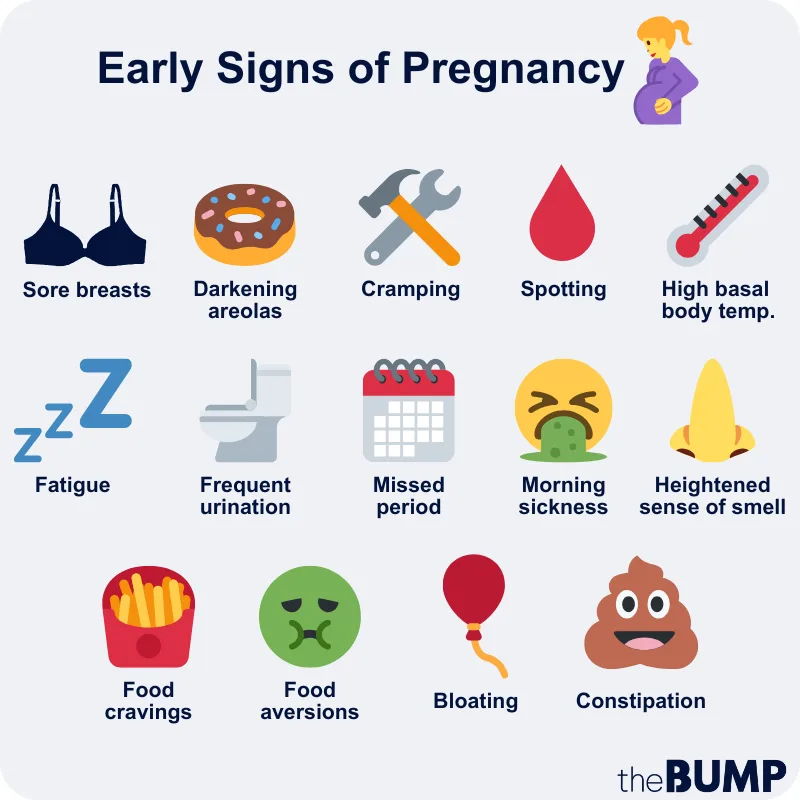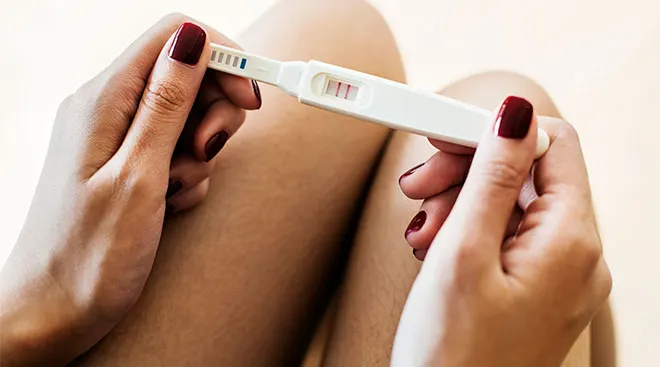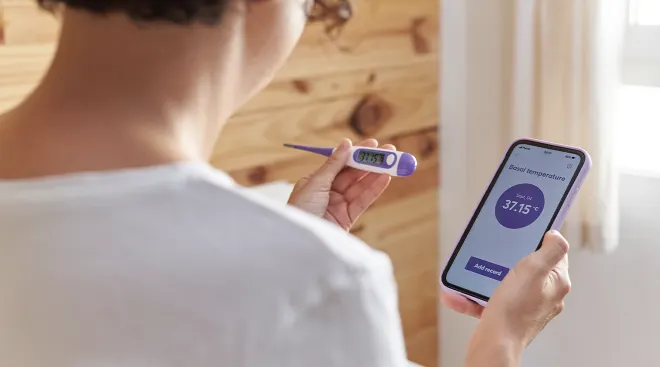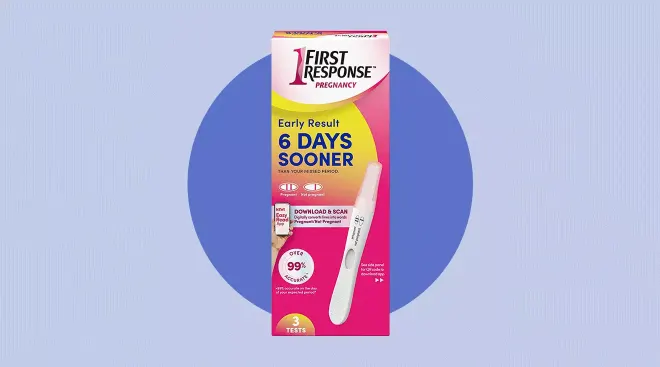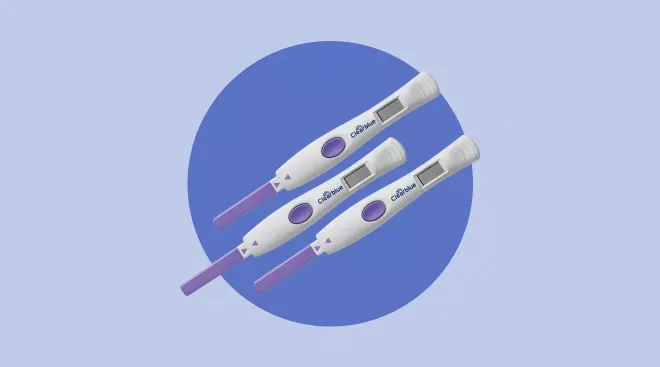15 Early Signs of Pregnancy—According to Experts and Real Moms
When you’re trying to conceive, any slight new symptom can get your heart pounding. Waiting to see if two pink lines are in store for you this month can feel agonizing, so it’s hard not to read into every twinge, cramp and extra trip to the bathroom. But what are the first signs of pregnancy you should really be on the lookout for? Will you really start craving strange food combinations? And what about morning sickness? Does every woman experience the same early pregnancy symptoms?
Here, with the help of medical experts, we break down the most common early signs of pregnancy, why they happen and what you can do to ease any ensuing discomfort. (Because let’s be honest, the symptoms of pregnancy don’t always feel the greatest.)
There’s no hard and fast rule for when early pregnancy symptoms kick in. Some women and pregnant people may begin noticing the first early signs of pregnancy a week or two after conception, while others will start to feel symptoms closer to four or five weeks after, when your period is conspicuously late, or even farther into pregnancy. According to a study published in the Journal of Clinical Epidemiology, most women (59 percent) experienced an onset of early pregnancy symptoms by their fifth or sixth week, while 71 percent reported symptoms by the end of week six and 89 percent by week eight.
Remember, each woman is on her own unique path to pregnancy, so symptoms and timing can vary. Whether you start to sense early symptoms of pregnancy immediately or later in pregnancy, don’t fret. “All women are different and don’t experience the same symptoms of early pregnancy,” says Michele D. Justice, MD, an ob-gyn at Inova Loudoun Hospital in Leesburg, Virginia. “Also, a second pregnancy can be different from the first.” And of course, just because you experience something that could be chalked up as a sign of pregnancy, it’s never a guarantee there’s a baby on board. If you think you might be pregnant, Justice says, your best bet is to take a pregnancy test.
So what are the signs of pregnancy to watch out for? Read on to learn more about them, straight from experts and real moms who’ve “been there felt that.”
1. Sore breasts
Are your boobs killing you? Do they feel tender and swollen? If so, it’s possible you’ve conceived this cycle. Sore breasts are often among the first early symptoms of pregnancy that women experience, which means you can also expect sore nipples in early pregnancy. You may start noticing differences in the way your breasts look, and it’s not uncommon for them to feel heavy and swollen. This is an early sign that your body is gearing up to start making milk.
Unfortunately, a lot of women experience soreness as a normal part of their monthly menstrual cycle, so it can be hard to tell the difference between the typical breast tenderness before your period vs an early pregnancy sign. But there’s one key difference: In pregnancy, the tenderness doesn’t go away like it normally does with PMS, Justice says. Instead, the painful, tingly sensations tend to get worse as time passes, often leveling off around the end of the first trimester.
Why does it happen?
During early pregnancy, levels of estrogen and progesterone hormones spike, which causes increased blood flow to your breasts. These hormones are also why some women experience breast tenderness around the time of ovulation and as part of PMS—but in that case, the hormones begin to plummet as you get closer to the start of your period, and the breast pain subsides. If you’ve conceived, your hormone levels will rise rather than fall and your breasts will become increasingly tender.
Is it common?
Don’t worry, you’re not the only one dealing with tender breasts and sore nipples in early pregnancy—it’s one of the most common early symptoms of pregnancy. For many women it lasts just a week or so, but others experience some level of breast tenderness for their entire pregnancy. Take comfort in the fact that this pain and tenderness means your breasts are preparing to nourish baby after they’re born!
What should you do?
Get a supportive bra to ease the discomfort of this pregnancy symptom. Talk to a professional who can help you with a fitting, and be sure to leave a little extra room. Trust us, your breasts are going to keep growing. And don’t be afraid to use either warm or cold compresses if things get really uncomfortable—just use whichever feels right for you.
My first clue was that my boobs were super tender, which they usually aren't even during my period. And then, I didn’t get my period that month, while it’s usually pretty regular. Those were for sure telltale signs! (Along with THREE positive pregnancy tests just to make sure!)
2. Darkening areolas
If you’re searching for early signs of pregnancy, you may want to take a look at your areolas—aka the area around your nipples. They can start to appear darker and larger as early as one or two weeks after conception, making this one of the more noticeable early signs of pregnancy. And that’s not all—look closely and you’ll see that the veins in your breasts are more visible as well. You might also notice little bumps popping up around the edges of your areolas. They’re called Montgomery tubercles, designed to help lubricate your nipples once baby is here and ready to nurse. If you haven’t realized it yet, your breasts will undergo lots of changes during pregnancy!
Why does it happen?
Like so many early signs of pregnancy, darkening areolas and veins are likely a result of surging pregnancy hormones. Although it’s not completely understood yet what causes the darker color, the most widely accepted explanation is that estrogen and progesterone cause the pigment cells in the skin (melanocytes) to be more active.
Is it common?
Darker areolas and veins will probably be one of the first signs of pregnancy you’ll notice, and they’re both extremely common. And it doesn’t stop there: Your areolas may continue to grow and deepen in color as your pregnancy progresses. Sometimes the changes are permanent, sometimes they’re not.
What should you do?
As with so many other pregnancy symptoms, this is one that requires a grin-and-bear-it approach. The deepening color shouldn’t be a cause for concern—it’s a harmless part of the pregnancy experience. Your nipples are probably much more tender now too, especially when you’re cold or something rubs against them. Applying warm compresses and wearing a lightweight, soft cotton bra can help.
3. Cramping
Wondering if cramping is a sign of pregnancy? Similar to sore breasts, cramping is among the early signs of pregnancy. The cramping shouldn’t be severe, though, so contact your provider if you’re doubled over in pain, if you feel intense pain on only one side or if you’re experiencing simultaneous bleeding and cramping (outside of your menstrual period, of course).
Why does it happen?
It can sometimes be difficult to distinguish between early pregnancy symptoms and signs that your period is on its way, especially when it comes to cramping. But even though they feel identical, cramps in pregnancy and period cramps are caused by different things. “The cramping that occurs during early pregnancy comes from the increased blood flow to the uterus,” Justice says. “The cramps before your period are due to increased prostaglandins that help the uterus prepare to shed its lining.”
Is it common?
Most women experience at least some cramping during their pregnancy. Just remember to contact your provider if you’re worried or if it becomes severe.
What should you do?
If you’re having cramps, don’t panic. Many women immediately fear a miscarriage, but according to Kimberly Harney, MD, a clinical associate professor of obstetrics and gynecology and maternal fetal medicine at the California-based Lucile Packard Children’s Hospital Stanford, “mild cramping in the pelvis that’s symmetrical and generally in the center above the pubic bone could be normal in early pregnancy.”
I was in Puerto Rico and had awful implantation cramps. SO painful, thought it was about to be that time of the month but that never came and I would just double over in pain multiple times a day. Took a test as soon as we got home, but we ended up in the ER later that night because I had no idea what implantation cramps were. Everything was fine and now we have a healthy baby.
4. Spotting
Having some light pink or brown spotting about a week before your period is due? If you’re wondering “can bleeding be a sign of pregnancy?” the answer is actually yes. It could be what’s called implantation bleeding, one of the early signs of pregnancy.
Spotting happens 6 to 12 days after conception, when a fertilized egg burrows deep into the lining of your uterus, causing a bit of mild irritation. When it’s happening, it can easily be confused with the onset of your period, so it’s one of those early pregnancy symptoms that’s often noticed only in hindsight. “You probably won’t know that the irregular bleeding you had was implantation bleeding until you get that positive pregnancy test and remember that you had some spotting,” Justice says.
Why does it happen?
It means you’ve got a baby on the way! A few days after conception, the fertilized egg travels down the fallopian tubes and settles in your uterus. There, the egg will attach to the wall of your uterus. Since your uterine lining is rich with blood, a little spotting can often occur and isn’t cause for concern.
Is it common?
Implantation spotting occurs in about 25 percent of women, according to Justice, so you may or may not encounter it. Remember, every woman is unique and will experience early pregnancy symptoms differently.
What should you do?
Keep your fingers crossed—this could be a good sign! Be sure to take a pregnancy test if your period is late to arrive to determine if your spotting really is an early sign of pregnancy. If it turns out you haven’t conceived, note the date the spotting occurred and which cycle day you were on. Pay close attention to your next few cycles and see if you notice any spotting—mid-cycle bleeding can be a sign of a medical condition that would require a doctor’s diagnosis, so definitely visit your ob-gyn if you notice a pattern.
5. Higher basal body temperature
If you’ve been charting your basal body temp, you may be privy to one of the subtle signs of pregnancy that many women won’t even notice: a higher than normal reading. When you’re charting, your basal (or waking) temperature peaks when you ovulate, then gradually decreases during the latter part of your cycle until your period begins. But if you get pregnant during the cycle, your basal temperature won’t plummet; instead, it’ll stay high.
Why does it happen?
Like so many pregnancy symptoms, your pregnancy hormones are hard at work again. If you don’t get pregnant, your levels of progesterone and estrogen will decrease, signaling your period to begin. But if an egg is fertilized, the opposite happens, and these hormones begin to rapidly rise. Your basal body temp will reflect that rise and you won’t see a dip after ovulation.
Is it common?
It’s not just common, it’s biology, baby! Progesterone and estrogen are the hormones that sustain a healthy pregnancy. When you’re pregnant, a sustained high basal body temperature is one of the pregnancy symptoms you’re guaranteed to see—if you check.
What should you do?
If you’ve been charting, just keep doing what you’re doing and enjoy seeing those high temps. If you haven’t been tracking it and are trying to conceive, consider starting a basal temperature chart to become more familiar with your cycle. The best time to start your chart is the day your period begins.
6. Fatigue
This can be one of the more difficult early signs of pregnancy to deal with. It’s not just a loss of energy we’re talking about here—it’s more of a can’t-keep-your-eyes-open-another-second total exhaustion that you’ll likely deal with throughout the first trimester. This mind-numbing fatigue sets in thanks to those pregnancy hormones and, more importantly, from your body’s efforts to nurture baby’s development.
Why does it happen?
Your body is working overtime to make sure baby has everything they need to grow for the next nine months, and boy, will you feel it! Your body is producing more blood to carry nutrients to your growing baby, and your blood sugar levels and blood pressure are lower. These factors, combined with high levels of the pregnancy hormones estrogen and progesterone, can all make you feel super sleepy.
Is it common?
Excessive fatigue is (unfortunately) among the common pregnancy symptoms during the first trimester and isn’t a cause for concern. The good news: You’ll probably enjoy a dramatic bump in energy as you round the corner of the second trimester.
What should you do?
Don’t be afraid to press snooze or take that early evening nap you’ve been daydreaming about. Basically, prioritize your sleep needs. There are also certain energy-boosting foods for pregnancy that can help you cope with first-trimester fatigue.
I knew waaay before a test! I was laying in bed and went to get up but had sharp ligament pains. I told my husband, ‘I’m pregnant!’ He said, take a test to make sure. I said ‘I’m sure!’ I waited another month and took one—and guess what? Pregnant!
7. Frequent urination
Peeing more than usual? It may not be one of the first early signs of pregnancy you notice, but having to urinate more frequently is definitely among the standard pregnancy signs and tends to kick in about two to three weeks after conception.
Why does it happen?
Once an egg has implanted in your uterus, the hCG hormone ramps up production and begins to rise dramatically. One of the side effects? It can make you feel like you’ve got to use the restroom every five minutes. If there’s a silver lining here, it’s that heightened hCG levels in your urine are used to detect pregnancy, which is how you’ll get a positive result on your home pregnancy test.
Is it common?
Every pregnant woman will have increased hCG levels, but not everyone will have that frequent urge to pee. If you do, there’s no cause for concern, since higher hCG levels are a good thing. As your pregnancy progresses, baby will get bigger and put more pressure on your bladder, so you might as well get used to making multiple trips to the bathroom.
What should you do?
If you’re slipping away to visit the ladies’ room all night and it’s not because you’ve been on top of your hydration game, pick up a pregnancy test and call your provider. It’s possible you have a baby on board!
8. Missed period
If you’re hoping to start the journey to motherhood, your heart probably races every time you visit the bathroom around the time your period is due. So it’s only natural to feel pretty excited if you’re late, even by a day! A missed period is often one of the telltale symptoms of pregnancy. In fact, sometimes it’s the first signal that you may have conceived. While the accuracy of a pregnancy test increases the longer you wait to take one, many pregnancy tests these days are able to detect hCG levels up to five days before your period is supposed to start.
Why does it happen?
Here’s a little refresher: You get your period every month when your egg isn’t fertilized. The egg breaks apart, causing hormone levels to drop and your body sheds the lining of your uterus. If you skip your period, it’s a good sign there’s a baby on board, busy nestling into your uterine wall.
Is it common?
A missed period is one of those pregnancy symptoms that all expectant women will have (does the phrase “I’m late” sound familiar?), but it isn’t uncommon to have a bit of spotting around the time your period would have arrived, which is related to the implantation of a fertilized egg (see above).
What should you do?
If your cycle is regular, missing your period is one of the first early signs of pregnancy, so try taking a pregnancy test (or calling your provider) to confirm.
9. Morning sickness
Feeling queasy? The one-two punch of nausea and vomiting are pregnancy signs that strike some women very early on, but for most sufferers the fun begins around week six. Morning sickness is a bit of a misnomer—while you’re likely to feel more nauseous on an empty stomach (like in the morning before you’ve had breakfast), that queasiness can pop up at any time of day.
Why does it happen?
The dramatic rise in hCG after implantation results in early pregnancy symptoms like nausea and vomiting. Why do some pregnant women heave at the mere thought of food while others can put away a six-course meal? According to Harney, it has to do with their brain chemistry. “The nausea center in their brain is more sensitive. Women who suffer from extreme nausea during pregnancy are the people who get motion sickness more easily, vomit more easily with stomach flu, etc.” This may be only part of the story, though, since some women experience morning sickness with one pregnancy but not another.
Is it common?
Experts think anywhere from 50 to 90 percent of pregnant women suffer from some form of morning sickness, so if you’re one of them, you’re in good company. If that’s not enough reassurance, just remember that the nausea and vomiting will be over before long—these early pregnancy symptoms usually don’t extend past the first trimester.
What should you do?
In most cases the queasiness isn’t too overwhelming, so listen to your body and try to stay calm. Yvonne Bohn, MD, an ob-gyn with Santa Monica Women’s Health, suggests eating small meals more frequently, nibbling on some crackers before getting out of bed, taking vitamin B6 or B12 or ginger tablets, and drinking low or non-caffeinated tea or ginger ale. But if you’re losing significant weight or can’t keep anything down, you may be suffering from a more serious problem (like hyperemesis gravidarum), so talk to your provider.
With my second I knew almost immediately without even needing a test. I was using cleaning chemicals and bent over on the floor when I got super nauseous. I knew why right away.
10. Heightened sense of smell
If your favorite dish suddenly smells like dead fish, you may be experiencing one of the more bizarre early signs of pregnancy. Often associated with morning sickness and all the lovely things that come with it, having a super sniffer isn’t exactly a blessing. Most of the time, the strong smells will seem nauseating to the mom-to-be.
Why does it happen?
No one knows the exact reason why pregnant women have such a strong sense of smell, so, like most pregnancy signs, most physicians just chalk it up to the increase in pregnancy hormones.
Is it common?
It doesn’t happen to everyone, but if you’re able to smell your boss’ lunch from all the way down the hall, rest assured, you’re not alone. Even better news? While it can be among the more annoying early pregnancy symptoms, it tends to subside after the first trimester.
What should you do?
If it’s really bothering you, try to stay away from those strong-smelling odors. Consider taking the stairs instead of the elevator so you’re not overwhelmed by someone’s perfume. Change lanes if you find yourself stuck behind an exhaust-heavy truck. At home, wash your clothes often (since odors cling to fibers) and switch to unscented cleaners and toiletries in order to curb those unpleasant smells.
11. Food cravings
Pickles and ice cream, anyone? It’s not a myth! If you’re expecting, chances are you might experience strong (and possibly bizarre!) food cravings, especially in the first trimester. Some common yearnings you can chalk up as pregnancy symptoms? Sweet, spicy, salty and sour. If you’re starting to crave some unusual combinations, it could very well be a symptom of pregnancy.
Why does it happen?
Experts aren’t sure why, but some think cravings are just your body’s way of telling you what it needs. So if you’re ravenous for pickles, that could mean your body needs something salty. You can blame raging hormones (again!) for messing with your senses of taste and smell.
Is it common?
It’s one of the most common pregnancy signs: Around 90 percent of moms-to-be crave something, so if you’ve got the urge for Thai food one minute and spicy gummy bears the next, it’s totally normal.
What should you do?
Moderate indulgence is fine (and totally inevitable), but watch your intake of empty calories, especially if they start to replace important nutrients. There are easy (and healthy!) snacks that will give your body the nutrients it needs without downing three quarts of ice cream.
I felt nauseous after eating bacon, which was weird. I took a test and it was positive.
12. Food aversions
Ah, pregnancy—the only topic where it’s totally normal to discuss cravings and aversions in the same breath. One of the more unusual signs of pregnancy, aversions to or distaste for certain foods during early pregnancy and food cravings may be opposite pregnancy symptoms, but they can be equally as strong. Common aversions include meat, onions and eggs, although a pregnant woman can develop a distaste for just about any food.
Why does it happen?
“Food aversions are more likely to occur during early pregnancy because of the extreme levels of nausea that can occur, and that can make your brain develop a strong dislike for the food that triggered the nausea,” Justice says. “No one likes to feel bad, and our brains try to protect us from this.” It’s also widely believed that food aversions during pregnancy are an evolutionary warning alarm; your body instinctively knows when a certain food, like raw chicken, is potentially dangerous.
Is it common?
It’s totally normal to feel repelled by certain foods during early pregnancy. Like many other early pregnancy symptoms, food aversions should subside after the first trimester.
What should you do?
The best way to deal is simply to avoid whatever foods are triggering your aversions. If it’s chicken, try eggs or another source of protein. If it’s milk, get your calcium fix from yogurt or even supplements (talk to your doctor first though!).
I couldn’t believe how tight my jeans felt in the very, very, very early days of my pregnancy. (We’re talking minutes after I got a positive test!) I was so instantly bloated around my midsection—it was like a pre-bump bump!
13. Bloating
Is bloating a sign of pregnancy? It can be! A boost in progesterone and estrogen is one of the common early pregnancy signs, causing many women to swell up early on—and with it often comes pregnancy gas. Abdominal pain or tightening, bloating, belching and passing gas all accompany pregnancy, sometimes for the entire nine months.
Why does it happen?
Progesterone (one of those pregnancy hormones) is relaxing smooth muscle tissues all over your body, including in your gastrointestinal tract. This makes your gut work slower, giving your body more time to snatch up nutrients from your food and take them to baby—and that translates into gas in early pregnancy (and beyond).
Is it common?
Consider this among those pregnancy symptoms that are par for the course, especially in early pregnancy. Nearly every mom-to-be will likely feel bloated at some point during her pregnancy (even if she doesn’t feel it right at the beginning).
What should you do?
Not a fan of pregnancy symptoms like gas and bloating? Eat small, regular meals and stay away from gas-causing foods like fried foods, sweets, cabbage and beans. Eating and drinking slowly will keep you from swallowing excess air (you’ll later use this technique when feeding baby), and loose clothing will keep you comfy. Yoga classes can also help settle things down. If your pregnancy gas is really intense, talk to your provider before taking medication.
14. Constipation
Is constipation a sign of pregnancy? It can be. It goes hand-in-hand with bloating, and occurs for all the same reasons. If you’re making more trips to the bathroom to pee but far fewer for the other, ahem, function, pregnancy could be the reason.
Why does it happen?
As increased levels of progesterone relax smooth muscle tissues, food begins to pass through your intestines more slowly, which can cause bowel movements to—you guessed it—move more slowly.
Is it common?
As with bloating and gas in early pregnancy, constipation is one of those pretty common pregnancy signs, although it’s not relegated to the first trimester—some women struggle with it during the entire nine months.
What should you do?
Eat as many fiber-rich foods as your queasy tummy will allow, and don’t forget to drink lots of water. If you’re really struggling, you might even consider adding a bit of white grape or pear juice to your diet. In addition, talk to your provider about switching to a different prenatal vitamin, since there are some that tend to cause less constipation than others.
15. Additional symptoms
While the above are some of the most common first symptoms of pregnancy, there are a few other things you may notice in the early days or months of your pregnancy.
- Mood Swings: You might start to experience mood swings similar to those you feel in the days leading up to your normal period. These uncontrollable shifts in your emotions occur due to changes in your hormones, especially in the first trimester when the levels of estrogen and progesterone change dramatically. Of course, mood swings can also be chalked up to the multitude of things on your mind these days. It’s normal to experience mounting anxiety in the early stages of your pregnancy—having a baby is a life-changing event!
- Acne: Pimples and zits can be another one of those not-so-fun pregnancy symptoms. During pregnancy, your hormones are delivering more blood to your vessels, which can cause your oil glands to go into overdrive. In some women, this can show up as a “pregnancy glow,” giving your face a flushed appearance, but for others, it can lead to acne.
- Heartburn: That burning sensation in your chest after eating can be another sign there’s a baby on board. Starting in the first trimester, those pregnancy hormones coursing through your body relax the valve between your stomach and esophagus, which can let stomach acid leak into your esophagus, causing heartburn.
- Weight Gain: Weight gain is of course another early pregnancy symptom, usually kicking in closer to the end of your first trimester. Weight gain varies from woman to woman, but putting on zero to five pounds within those first three months is normal.
Frequently Asked Questions
Is diarrhea a sign of pregnancy?
According to Lisa Jackson, MD, FACOG, an ob-gyn and partner at Uptown OBGYN of New York, constipation is more common than diarrhea when it comes to pregnancy signs. That said, no two people will have the same symptoms and signs of pregnancy. Plus, diarrhea can become more common as the uterus grows and displaces the gastrointestinal tract, Jackson adds.
What is the earliest indication of pregnancy?
While your shifting hormones will be the earliest sign of pregnancy, everyone’s “affected by the surge in hCG and progesterone differently,” Jackson notes. For some, it may lead to breast tenderness and nausea as the first signs of pregnancy. But for others it may not lead to any symptoms at all. “Symptoms are not necessary for a normal pregnancy,” she says, adding, “Sometimes a missed period with a positive pregnancy test will be your earliest indication that you’re pregnant."
Are there any early signs of pregnancy before a missed period?
Again, this will vary for each person. According to Jackson, there are no guaranteed first signs of pregnancy before a missed period and positive pregnancy test. Some women may experience breast tenderness, but keep in mind this is also a normal symptom of premenstrual syndrome and doesn’t guarantee pregnancy, she adds.
What are some uncommon early pregnancy symptoms in the first month?
Per Mayo Clinic some less common early pregnancy symptoms include moodiness, bloating, light spotting, cramping and nasal congestion. But keep in mind these will differ for each person. “Pretty much any symptom can be blamed on early pregnancy,” Jackson notes. “Symptoms that should be reported to your doctor are abdominal pain and bleeding.”
How can you tell you’re pregnant without a test?
A well-timed pregnancy test is the most reliable way to confirm a pregnancy at home. Once pregnancy has been established, your hCG levels will increase and can be detected through your urine (such as with an at-home test) or with a blood test in your provider’s office. “Once the pregnancy has progressed past five weeks, you can detect a pregnancy through ultrasound. Before this, blood work and urine are the only way to detect a pregnancy,” Jackson says.
When should I take a pregnancy test?
It’s always best to take a pregnancy test if you have regular periods and are more than a day late in getting it, Jackson says. But it’s important to time it correctly, as taking it too early can result in a false negative, as it may be too early to detect enough hCG in the urine.
Could I have pregnancy symptoms and not be pregnant?
Many symptoms relating to pregnancy—such as bloating, nausea and breast tenderness—may be related to other aspects of ob-gyn care, Jackson notes, including your menstrual cycle or conditions like PCOS. So you very well could have “pregnancy symptoms” and not be pregnant.
When it comes to your pregnancy, the only way to confirm it is with a test. “Pregnancy can present in so many ways, and it’s easy to rule out with urine or blood testing. So always be sure, and never rely on just symptoms,” Jackson says. And remember that no two women are the same. Your journey may be different from your best friend’s pregnancy or even your previous pregnancies. Be kind and patient with yourself, and don’t hesitate to contact your provider if you are ever unsure about your symptoms or the severity of your symptoms.
Please note: The Bump and the materials and information it contains are not intended to, and do not constitute, medical or other health advice or diagnosis and should not be used as such. You should always consult with a qualified physician or health professional about your specific circumstances.
Plus, more from The Bump:
Lisa Jackson, MD, FACOG, is an ob-gyn with over 15 years of experience and a partner at Uptown OBGYN of New York. She earned her medical degree from Vanderbilt University School of Medicine in Nashville, Tennessee and completed her residency in Chicago at Rush University Medical Center. She also serves as an assistant clinical professor of ob-gyn at the Mount Sinai Hospital in New York City.
Michele D. Justice, MD, is an ob-gyn at Inova Loudoun Hospital in Leesburg, Virginia. She earned her medical degree from University of Virginia in 2008 and specializes in minimally invasive gynecological surgery.
Kimberly Harney, MD, is a clinical associate professor of obstetrics and gynecology and maternal fetal medicine at the California-based Lucile Packard Children’s Hospital Stanford. She earned her medical degree from UC Irvine School of Medicine, Irvine, California, in 1981.
Yvonne Bohn, MD, is an ob-gyn with Santa Monica Women's Health and coauthor of The Mommy Docs’ Ultimate Guide to Pregnancy and Birth. She earned her medical degree from USC School of Medicine in Los Angeles and completed her residency at USC California Women's and Children's Hospital.
Journal of Clinical Epidemiology, A prospective study of the onset of symptoms of pregnancy
Mayo Clinic, [Symptoms of pregnancy: What happens first](https://www.mayoclinic.org/healthy-lifestyle/getting-pregnant/in-depth/symptoms-of-pregnancy/art-20043853, March 2024
Learn how we ensure the accuracy of our content through our editorial and medical review process.
Navigate forward to interact with the calendar and select a date. Press the question mark key to get the keyboard shortcuts for changing dates.

































